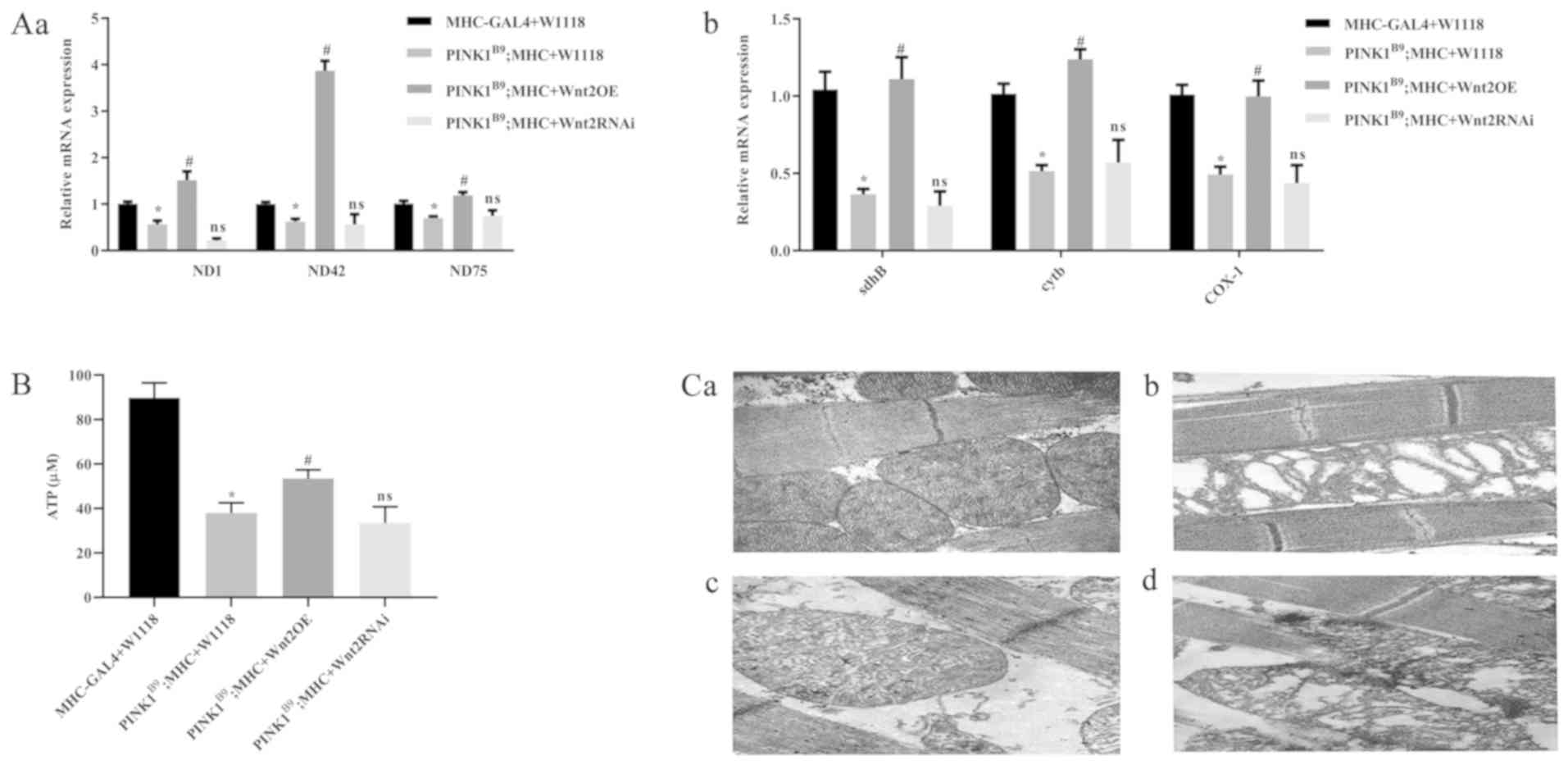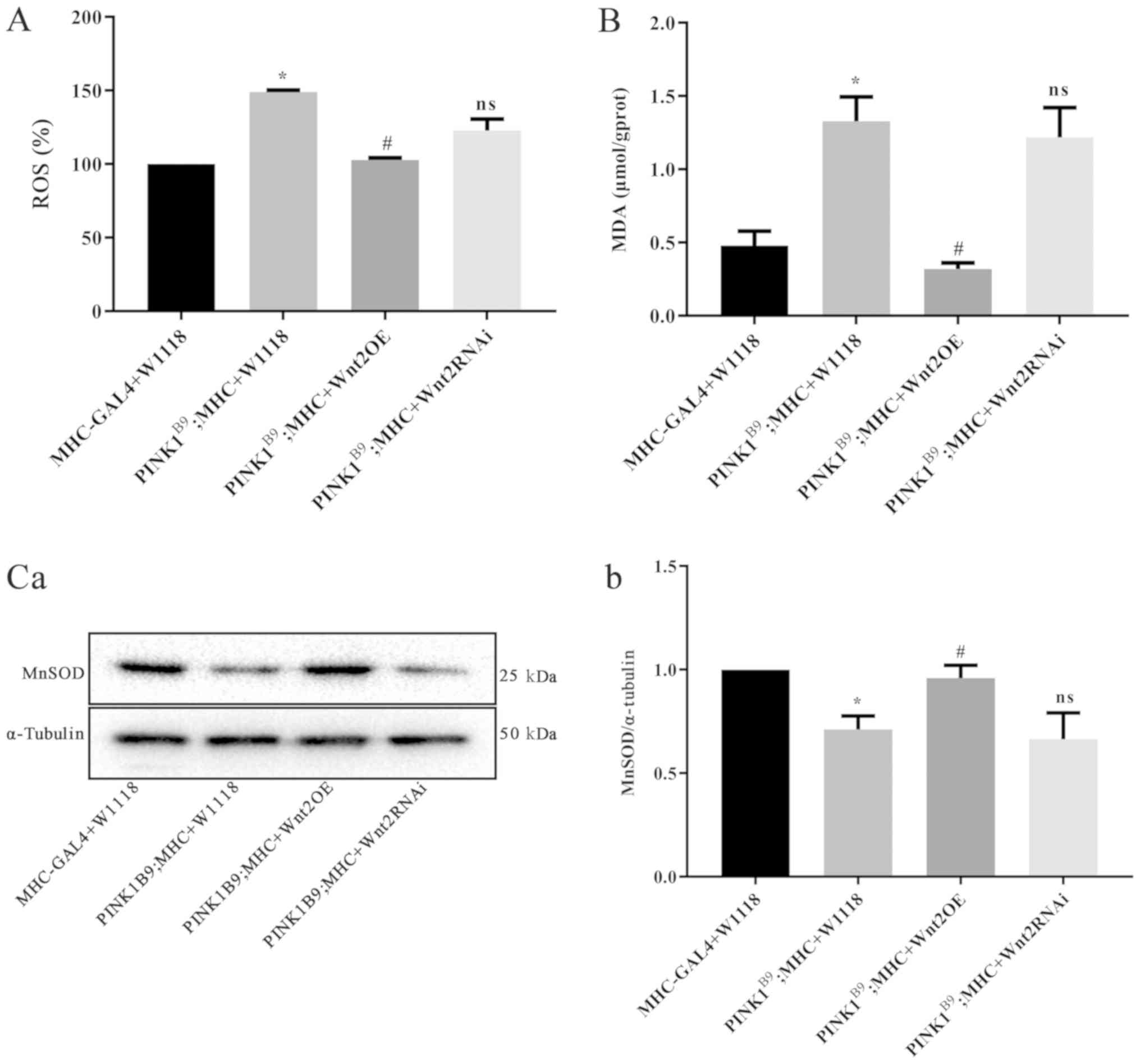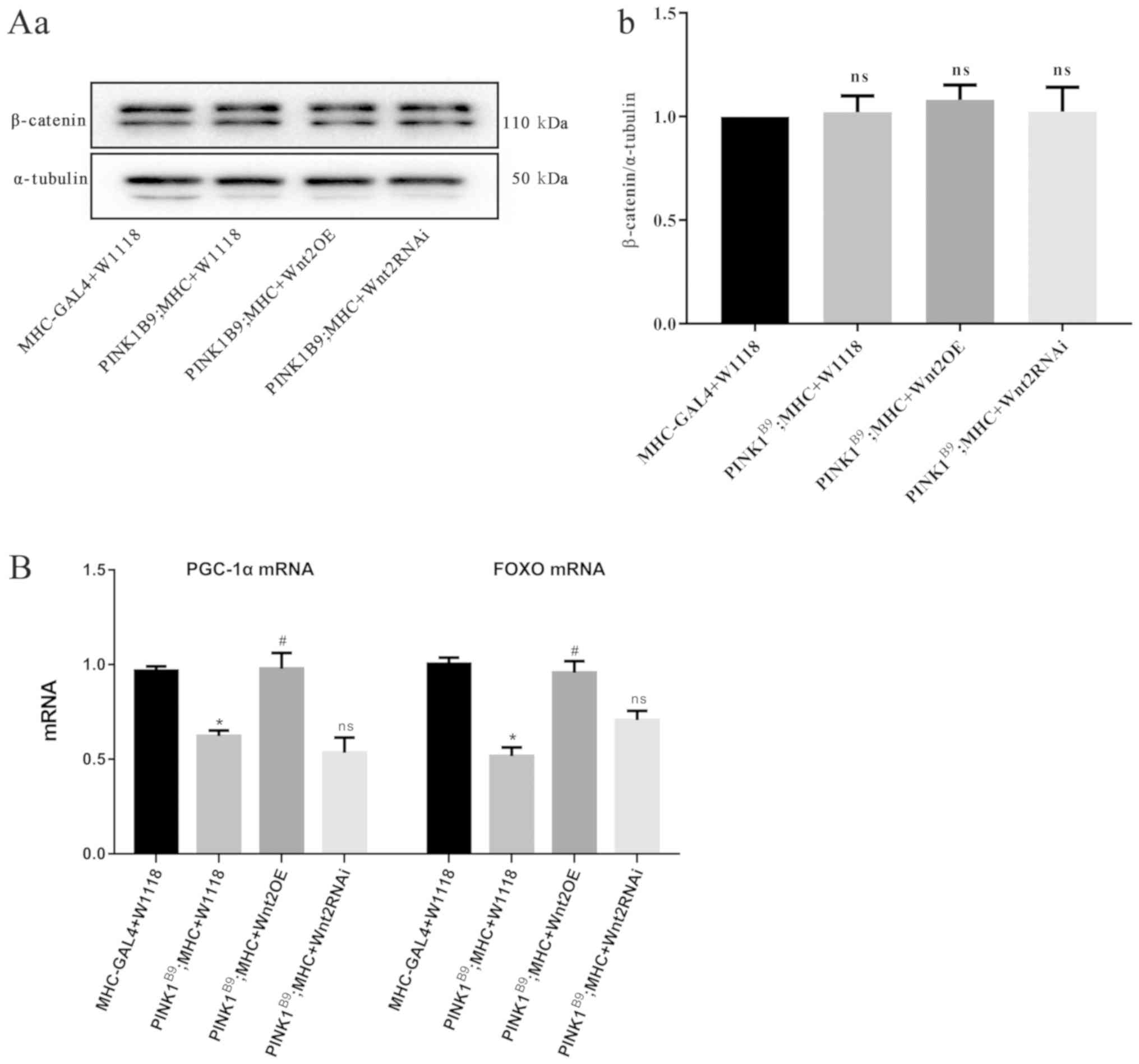|
1
|
Zhou C, Huang Y, Shao Y, May J, Prou D,
Perier C, Dauer W, Schon EA and Przedborski S: The kinase domain of
mitochondrial PINK1 faces the cytoplasm. Proc Natl Acad Sci USA.
105:12022–12027. 2008. View Article : Google Scholar : PubMed/NCBI
|
|
2
|
Hatano Y, Li Y, Sato K, Asakawa S,
Yamamura Y, Tomiyama H, Yoshino H, Asahina M, Kobayashi S,
Hassin-Baer S, et al: Novel PINK1 mutations in early-onset
parkinsonism. Ann Neurol. 56:424–427. 2004. View Article : Google Scholar : PubMed/NCBI
|
|
3
|
Liu S, Sawada T, Lee S, Yu W, Silverio G,
Alapatt P, Millan I, Shen A, Saxton W, Kanao T, et al: Parkinson's
disease-associated kinase PINK1 regulates Miro protein level and
axonal transport of mitochondria. PLoS Genet. 8:e10025372012.
View Article : Google Scholar : PubMed/NCBI
|
|
4
|
Wang W, Wang X, Fujioka H, Hoppel C, Whone
AL, Caldwell MA, Cullen PJ, Liu J and Zhu X: Parkinson's
disease-associated mutant VPS35 causes mitochondrial dysfunction by
recycling DLP1 complexes. Nat Med. 22:54–63. 2016. View Article : Google Scholar : PubMed/NCBI
|
|
5
|
Wu Z, Wang Y, Lim J, Liu B, Li Y, Vartak
R, Stankiewicz T, Montgomery S and Lu B: Ubiquitination of ABCE1 by
NOT4 in response to mitochondrial damage links co-translational
quality control to PINK1-directed mitophagy. Cell Metab.
28:130–144.e7. 2018. View Article : Google Scholar : PubMed/NCBI
|
|
6
|
Oh SE, Park HJ, He L, Skibiel C, Junn E
and Mouradian MM: The Parkinson's disease gene product DJ-1
modulates miR-221 to promote neuronal survival against oxidative
stress. Redox Biol. 19:62–73. 2018. View Article : Google Scholar : PubMed/NCBI
|
|
7
|
Burbulla LF, Song P, Mazzulli JR, Zampese
E, Wong YC, Jeon S, Santos DP, Blanz J, Obermaier CD, Strojny C, et
al: Dopamine oxidation mediates mitochondrial and lysosomal
dysfunction in Parkinson's disease. Science. 357:1255–1261. 2017.
View Article : Google Scholar : PubMed/NCBI
|
|
8
|
Andersson ER, Saltó C, Villaescusa JC,
Cajanek L, Yang S, Bryjova L, Nagy II, Vainio SJ, Ramirez C, Bryja
V, et al: Wnt5a cooperates with canonical Wnts to generate midbrain
dopaminergic neurons in vivo and in stem cells. Proc Natl Acad Sci
USA. 110:E602–E610. 2013. View Article : Google Scholar : PubMed/NCBI
|
|
9
|
Sousa KM, Villaescusa JC, Cajanek L, Ondr
JK, Castelo-Branco G, Hofstra W, Bryja V, Palmberg C, Bergman T,
Wainwright B, et al: Wnt2 regulates progenitor proliferation in the
developing ventral midbrain. J Biol Chem. 285:7246–7253. 2010.
View Article : Google Scholar : PubMed/NCBI
|
|
10
|
Marui T, Funatogawa I, Koishi S, Yamamoto
K, Matsumoto H, Hashimoto O, Jinde S, Nishida H, Sugiyama T, Kasai
K, et al: Association between autism and variants in the
wingless-type MMTV integration site family member 2 (WNT2) gene.
Int J Neuropsychopharmacol. 13:443–449. 2010. View Article : Google Scholar : PubMed/NCBI
|
|
11
|
Zhang X, Abreu JG, Yokota C, MacDonald BT,
Singh S, Coburn KL, Cheong SM, Zhang MM, Ye QZ, Hang HC, et al:
Tiki1 is required for head formation via Wnt cleavage-oxidation and
inactivation. Cell. 149:1565–1577. 2012. View Article : Google Scholar : PubMed/NCBI
|
|
12
|
Kahn M: Can we safely target the WNT
pathway? Nat Rev Drug Discov. 13:513–532. 2014. View Article : Google Scholar : PubMed/NCBI
|
|
13
|
Parker JA, Vazquez-Manrique RP, Tourette
C, Farina F, Offner N, Mukhopadhyay A, Orfila AM, Darbois A, Menet
S, Tissenbaum HA, et al: Integration of β-catenin, sirtuin, and
FOXO signaling protects from mutant huntingtin toxicity. J
Neurosci. 32:12630–12640. 2012. View Article : Google Scholar : PubMed/NCBI
|
|
14
|
Arrázola MS, Ramos-Fernández E, Cisternas
P, Ordenes D and Inestrosa NC: Wnt signaling prevents the Aβ
oligomer-induced mitochondrial permeability transition pore opening
preserving mitochondrial Structure in hippocampal neurons. PLoS
One. 12:e01688402017. View Article : Google Scholar : PubMed/NCBI
|
|
15
|
Wei L, Ding L, Mo MS, Lei M, Zhang L, Chen
K and Xu P: Wnt3a protects SH-SY5Y cells against 6-hydroxydopamine
toxicity by restoration of mitochondria function. Transl
Neurodegener. 4:112015. View Article : Google Scholar : PubMed/NCBI
|
|
16
|
Yang Y, Gehrke S, Imai Y, Huang Z, Ouyang
Y, Wang JW, Yang L, Beal MF, Vogel H and Lu B: Mitochondrial
pathology and muscle and dopaminergic neuron degeneration caused by
inactivation of Drosophila Pink1 is rescued by Parkin. Proc Natl
Acad Sci USA. 103:10793–10798. 2006. View Article : Google Scholar : PubMed/NCBI
|
|
17
|
Liu W, Acín-Peréz R, Geghman KD, Manfredi
G, Lu B and Li C: Pink1 regulates the oxidative phosphorylation
machinery via mitochondrial fission. Proc Natl Acad Sci USA.
108:12920–12924. 2011. View Article : Google Scholar : PubMed/NCBI
|
|
18
|
Dung VM and Thao DTP: Parkinson's Disease
Model. Adv Exp Med Biol. 1076:41–61. 2018. View Article : Google Scholar : PubMed/NCBI
|
|
19
|
Bilder D and Irvine KD: Taking stock of
the Drosophila research ecosystem. Genetics. 206:1227–1236. 2017.
View Article : Google Scholar : PubMed/NCBI
|
|
20
|
Barwell T, DeVeale B, Poirier L, Zheng J,
Seroude F and Seroude L: Regulating the UAS/GAL4 system in adult
Drosophila with Tet-off GAL80 transgenes. PeerJ. 5:e41672017.
View Article : Google Scholar : PubMed/NCBI
|
|
21
|
Southall TD, Elliott DA and Brand AH: The
GAL4 system: A versatile toolkit for gene expression in Drosophila.
CSH Protoc. doi:10.1101/pdb.top49.
|
|
22
|
Tu H and Casadaban MJ: The upstream
activating sequence for L-leucine gene regulation in Saccharomyces
cerevisiae. Nucleic Acids Res. 18:3923–3931. 1990. View Article : Google Scholar : PubMed/NCBI
|
|
23
|
Robertson LK, Dey BK, Campos AR and
Mahaffey JW: Expression of the drosophila gene disconnected using
the UAS/GAL4 system. Genesis. 34:103–106. 2002. View Article : Google Scholar : PubMed/NCBI
|
|
24
|
Park J, Lee SB, Lee S, Kim Y, Song S, Kim
S, Bae E, Kim J, Shong M and Kim JM: Mitochondrial dysfunction in
Drosophila PINK1 mutants is complemented by parkin. Nature.
441:1157–1161. 2006. View Article : Google Scholar : PubMed/NCBI
|
|
25
|
Livak KJ and Schmittgen TD: Analysis of
relative gene expression data using real-time quantitative PCR and
the 2(-Delta Delta C(T)) Method. Methods. 25:402–408. 2001.
View Article : Google Scholar : PubMed/NCBI
|
|
26
|
Rogério M, Cardoso C and Pestana C:
Measurement of malondialdehyde in fish: A comparison study between
HPLC methods and the traditional spectrophotometric test. Food
Chem. 112:1038–1045. 2009. View Article : Google Scholar
|
|
27
|
Dragun Z, Filipović Marijić V, Krasnići N,
Ramani S, Valić D, Rebok K, Kostov V, Jordanova M and Erk M:
Malondialdehyde concentrations in the intestine and gills of Vardar
chub (Squalius vardarensis Karaman) as indicator of lipid
peroxidation. Environ Sci Pollut Res Int. 24:16917–16926. 2017.
View Article : Google Scholar : PubMed/NCBI
|
|
28
|
Boonchai W, Walsh M, Cummings M and
Chenevix-Trench G: Expression of beta-catenin, a key mediator of
the WNT signaling pathway, in basal cell carcinoma. Arch Dermatol.
136:937–938. 2000. View Article : Google Scholar : PubMed/NCBI
|
|
29
|
Gehrke S, Wu Z, Klinkenberg M, Sun Y,
Auburger G, Guo S and Lu B: PINK1 and Parkin control localized
translation of respiratory chain component mRNAs on mitochondria
outer membrane. Cell Metabolism. 21:95–108. 2015. View Article : Google Scholar : PubMed/NCBI
|
|
30
|
Tsunemi T and La Spada AR: PGC-1α at the
intersection of bioenergetics regulation and neuron function: From
Huntington's disease to Parkinson's disease and beyond. Prog
Neurobiol. 97:142–151. 2012. View Article : Google Scholar : PubMed/NCBI
|
|
31
|
Zorov DB, Juhaszova M and Sollott SJ:
Mitochondrial reactive oxygen species (ROS) and ROS-induced ROS
release. Physiol Rev. 94:909–950. 2014. View Article : Google Scholar : PubMed/NCBI
|
|
32
|
Ray A, Martinez BA, Berkowitz LA, Caldwell
GA and Caldwell KA: Mitochondrial dysfunction, oxidative stress,
and neurodegeneration elicited by a bacterial metabolite in a C.
elegans Parkinson's model. Cell Death Dis. 5:e9842014. View Article : Google Scholar : PubMed/NCBI
|
|
33
|
Subramaniam SR and Chesselet MF:
Mitochondrial dysfunction and oxidative stress in Parkinson's
disease. Prog Neurobiol 106–107. 17–32. 2013. View Article : Google Scholar
|
|
34
|
Kudryavtseva AV, Krasnov GS, Dmitriev AA,
Alekseev BY, Kardymon OL, Sadritdinova AF, Fedorova MS, Pokrovsky
AV, Melnikova NV, Kaprin AD, et al: Mitochondrial dysfunction and
oxidative stress in aging and cancer. Oncotarget. 7:44879–44905.
2016. View Article : Google Scholar : PubMed/NCBI
|
|
35
|
Zuo L and Motherwell MS: The impact of
reactive oxygen species and genetic mitochondrial mutations in
Parkinson's disease. Gene. 532:18–23. 2013. View Article : Google Scholar : PubMed/NCBI
|
|
36
|
Weismann D, Hartvigsen K, Lauer N, Bennett
KL, Scholl HP, Charbel Issa P, Cano M, Brandstätter H, Tsimikas S
and Skerka C: Complement factor H binds malondialdehyde epitopes
and protects from oxidative stress. Nature. 478:76–81. 2011.
View Article : Google Scholar : PubMed/NCBI
|
|
37
|
Sheshadri P and Kumar A: Managing odds in
stem cells: Insights into the role of mitochondrial antioxidant
enzyme MnSOD. Free Radic Res. 50:570–584. 2016. View Article : Google Scholar : PubMed/NCBI
|
|
38
|
Koh H, Kim H, Kim MJ, Park J, Lee HJ and
Chung J: Silent information regulator 2 (Sir2) and Forkhead box O
(FOXO) complement mitochondrial dysfunction and dopaminergic neuron
loss in Drosophila PTEN-induced kinase 1 (PINK1) null mutant. J
Biol Chem. 287:12750–12758. 2012. View Article : Google Scholar : PubMed/NCBI
|
|
39
|
Swarup S and Verheyen EM: Wnt/Wingless
signaling in Drosophila. Cold Spring Harb Perspect Biol.
4:a0079302012. View Article : Google Scholar : PubMed/NCBI
|
|
40
|
Yu M, Ting DT, Stott SL, Wittner BS,
Ozsolak F, Paul S, Ciciliano JC, Smas ME, Winokur D and Gilman AJ:
RNA sequencing of pancreatic circulating tumour cells implicates
WNT signalling in metastasis. Nature. 487:510–513. 2012. View Article : Google Scholar : PubMed/NCBI
|
|
41
|
Mukherjee S and Duttaroy A: Spargel/dPGC-1
is a new downstream effector in the insulin-TOR signaling pathway
in Drosophila. Genetics. 195:433–441. 2013. View Article : Google Scholar : PubMed/NCBI
|
|
42
|
Salih DA, Rashid AJ, Colas D, de la
Torre-Ubieta L, Zhu RP, Morgan AA, Santo EE, Ucar D, Devarajan K,
Cole CJ, et al: FoxO6 regulates memory consolidation and synaptic
function. Genes Dev. 26:2780–2801. 2012. View Article : Google Scholar : PubMed/NCBI
|
|
43
|
Sears JC and Broihier HT: FoxO regulates
microtubule dynamics and polarity to promote dendrite branching in
Drosophila sensory neurons. Dev Biol. 418:40–54. 2016. View Article : Google Scholar : PubMed/NCBI
|
|
44
|
Kops GJ, Dansen TB, Polderman PE, Saarloos
I, Wirtz KW, Coffer PJ, Huang TT, Bos JL, Medema RH and Burgering
BM: Forkhead transcription factor FOXO3a protects quiescent cells
from oxidative stress. Nature. 419:316–321. 2002. View Article : Google Scholar : PubMed/NCBI
|
|
45
|
Puigserver P, Rhee J, Donovan J, Walkey
CJ, Yoon JC, Oriente F, Kitamura Y, Altomonte J, Dong H, Accili D,
et al: Insulin-regulated hepatic gluconeogenesis through
FOXO1-PGC-1alpha interaction. Nature. 423:550–555. 2003. View Article : Google Scholar : PubMed/NCBI
|
|
46
|
Speckmann B, Walter PL, Alili L, Reinehr
R, Sies H, Klotz LO and Steinbrenner H: Selenoprotein P expression
is controlled through interaction of the coactivator PGC-1alpha
with FoxO1a and hepatocyte nuclear factor 4alpha transcription
factors. Hepatology. 48:1998–2006. 2008. View Article : Google Scholar : PubMed/NCBI
|
|
47
|
Chung HW, Lim JH, Kim MY, Shin SJ, Chung
S, Choi BS, Kim HW, Kim YS, Park CW and Chang YS: High-fat
diet-induced renal cell apoptosis and oxidative stress in
spontaneously hypertensive rat are ameliorated by fenofibrate
through the PPARα-FoxO3a-PGC-1α pathway. Nephrol Dial Transplant.
27:2213–2225. 2012. View Article : Google Scholar : PubMed/NCBI
|
|
48
|
Geng T, Li P, Yin X and Yan Z: PGC-1α
promotes nitric oxide antioxidant defenses and inhibits FOXO
signaling against cardiac cachexia in mice. Am J Pathol.
178:1738–1748. 2011. View Article : Google Scholar : PubMed/NCBI
|
|
49
|
Essers MA, de Vries-Smits LM, Barker N,
Polderman PE, Burgering BM and Korswagen HC: Functional interaction
between beta-catenin and FOXO in oxidative stress signaling.
Science. 308:1181–1184. 2005. View Article : Google Scholar : PubMed/NCBI
|
|
50
|
Yang Y, Cehrke S, Imai Y, Huang Z, Ouyang
Y, Wang JW, Yang L, Beal MF, Vogel H and Lu B: Mitochondrial
pathology and muscle and dopaminergic neuron degeneration caused by
inactivitation of Drosophila Pink1 is rescued by Parkin. Proc Natl
Acad Sci USA. 103:10793–10798. 2006. View Article : Google Scholar : PubMed/NCBI
|


















